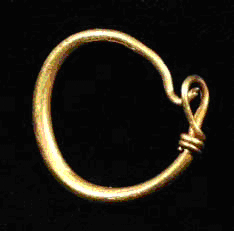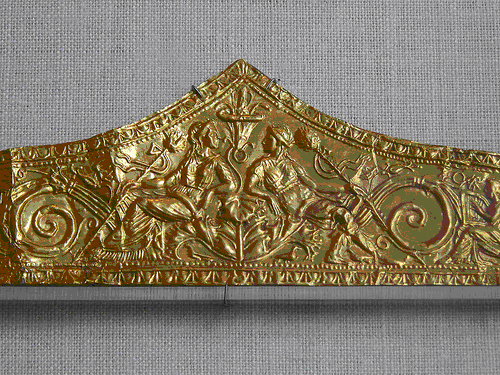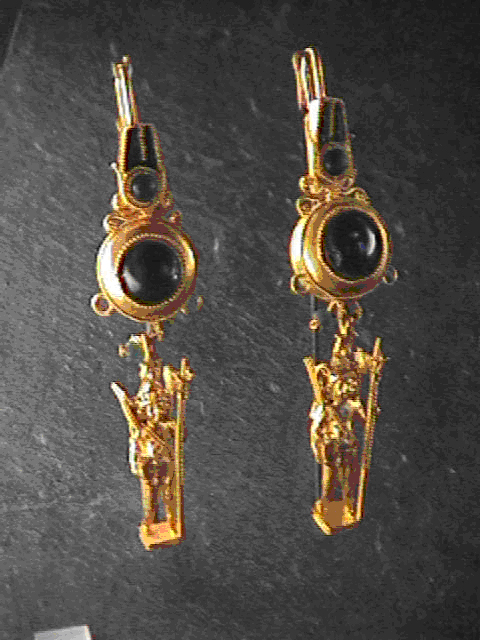Dan and Diane’s Proposal at the Basilica!
Best regards, Dan

Best regards, Dan
;-)
You know what Beth, when one finds special people … one holds onto them.
I was so fortunate to discover Joseph Schubach and you….
And in some way, with my own decadent pleasures, you have given me the ability to spoil myself with what I love the most, high quality jewellery.
So I cannot complain.
Thank you and I look forward to my next visit in the States and our next project.
Have a fantastic weekend.
S
Darkened metals possess a hard, edgy look that has been hitting the mainstream in a major way this season. When comparing it to some of the lighter metals, you’ll notice a more complex look that seems to really gyve with the more urban fashions of the Fall.
Remember, any of the pieces below can be recreated and revised according to your particular tastes. What you envision, we create.
I am so sorry this message has come so late, but I just wanted to thank you for my gorgeous ring! It is more than I could have ever imagined! I am truly amazed at the craftsmanship and all the intricate, diligent work that went into the creation of this extraordinary ring. It is absolutely beautiful and even after having it for several months, (he surprised me with it in April,) it still catches my eye! M and I plan on getting married next May, and will hopefully get to talk to you soon about a matching wedding band!
With heartfelt thanks,
L and M
Hi Joe, I received my ring and I absolutely love it!! Looks so beautiful and I can’t believe how brilliant and sparkly the diamond is. You did a fabulous job!! Thank you for giving me my ring back and making it look so good. My sister loved it as well. You have been great to deal with and I would refer anyone to Schubach!!!
Dear readers:
We’re happy to share with you a few of the winning pieces at AGTA’s (American Gem Trade Association), revealed at the AGTA Spectrum Awards in New York City last week. To see all of the winners, check them out here.

This platinum and 18-karat yellow gold Samuel Getz Designs necklace won first place in the "Classical" category of the Spectrum Awards. It features yellow and blue sapphires, red spinel and diamonds.
First-place winners were:
Best of Show
Todd Reed, Todd Reed, Inc.
Palladium cuff bracelet featuring a 22.40-carat aquamarine accented with 6.90 carats of grey diamonds and 2.2 carats of white diamonds.
Best Use of Color
Martin Key, Martin Key Co.
22-karat yellow gold “Frame” ring featuring a 1.50-carat blue tourmaline accented with four Mexican fire opal baguettes, total carat weight 1.82.
Best Use of Platinum and Color
Niveet Nagpal, Omi Gems, Inc.
Platinum “Princess of Ratnapura” bracelet featuring nine round sapphires (14 carats total) and 8.48 carats of round diamonds.
Best Use of Pearls
Llyn L. Strelau, Jewels by Design
Sculpture titled “Who Are You” (pictured above) featuring two-tone gold and silver with freshwater baroque pearls, South Sea keshi pearls, akoya seed pearls, demantoid garnets, a 0.20-carat ruby and 0.03 carats of cognac diamonds on a crystal quartz base.
Fashion Forward
Gregore Morin, Gregore Joailliers
18-karat white and yellow gold earrings featuring a 22-carat lemon chrysoprase accented with 2.38 carats of garnets.
SPECTRUM AWARDS
Bridal Wear
First place:
Niveet Nagpal, Omi Gems, Inc.
Platinum and 18-karat yellow gold ring featuring a 5.55-carat oval tsavorite garnet accented with fancy yellow diamonds.
Business/Day Wear
First place and Best of Show:
Todd Reed, Todd Reed, Inc.
Palladium cuff bracelet (pictured above) featuring a 22.40-carat aquamarine accented with 6.90 carats of grey diamonds and 2.20 carats of white diamonds.
Classical
First place:
Samuel Getz, Samuel Getz Designs
Platinum and 18-karat yellow gold necklace featuring 68.77 carats of yellow sapphires, 24.34 carats of blue sapphires and 24.20 carats of red spinels with 22.38 carats of diamonds.
Evening Wear
First place:
Cynthia Renee Zava, Cynthia Renee Zava
Palladium necklace (pictured above) featuring a suite of green tourmalines, 75.89 carats total.
Men’s Wear
First place:
Mark Lauer, Mark Michael Designs
18-karat yellow gold cufflinks featuring jasper agate and lapis lazuli composite accented with 2-mm spessartite garnets and sapphires.
CUTTING EDGE AWARDS
Classic Cut Gemstones
Open Category Classic Gemstone
First place:
Joseph Ambalu, Amba Gem Corp.
8.04-carat pigeon blood ruby.
Open Category All Other Faceted
First place:
Ruben Bindra, B & B Fine Gems, 9.59-carat trillion-cut red spinel.
Phenomenal Gemstones
First place:
Robyn Dufty, DuftyWeis Opals, Inc., 36.73-carat Mexican fire Opal cabochon.
Pairs & Suites
First place:
Clay Zava, Zava Mastercuts
Suite of pastel Cuprian tourmalines, 127.40 carats total weight.
Faceting
First place:
Jeff L. White, J.L. White Fine Gemstones
48.83-carat square, cushion-cut morganite.
Carving
First place:
Joseph August Voss, Joseph August Voss
220.30-carat crystal quartz carving.
Combination
First place:
Thomas Trozzo, Trozzo
66.48-carat square, dimple, concaved, scissor-cut aquamarine.
We work with a variety of gems here at Joseph Schubach Jewelers. Today, I’d like to highlight some of the breathtakingly beautiful blue stones. Many people will think of sapphire or lapis or even tanzanite, but there are a number of other blue gemstones which come in different shades including azure, cobalt, navy and indigo.
Lapiz Lazuli
Rainbow Hermatite
Titanium Drusy
London Blue Topaz
Blue Moonstone
Tanzanite
Spectrolite
Boulder Opal
The “Star of Lanka” is a 193-carat, oval, cabochon-cut, high domed, blue star sapphire with a distinct six-rayed star positioned at the center of the dome-shaped face, with its arms extending down to the base of the stone. In terms of the quality of the star, the “Star of Lanka” rivals its more famous cousins such as the “Star of India” and the “Star of Bombay.” The stone is opaque and milky, which tends to reduce the tone of the blue color of the sapphire. The color of the sapphire is a grayish blue. The dimensions of the gemstone are 30mm x 27mm x 23 mm.
Take a look at these amazing (and ancient) pieces of jewelry from the Middle East.
Every artifact serves as a symbol of information. Apotropeic emblems, borrowed from everyday life, epos, or myths, and used in the art of jewelry making, carried a certain magical connotation. Popularity of a particular mythological plot line was connected to the very zeitgeist of the given time period, since the jewelry maker lived through it and tended to be deeply involved with the contemporary events. The art reflected the master’s interests in what was currently happening with the society.

The simple-style earrings- as a ring, can be dated precisely by using radioisotope analysis, especially consider the items’ popularity. Earrings of that type are well-known from the images of the Achaemenian era (guards of Persepolis wore a single earring similar to the one in our collection; today youths and young men prefer this type as well). Earrings of this type were produced by casting method followed by polishing.

It is known that diadems were a special sign of a god or royalty. Gold garlands were kept in temples as parts of gold funds and were given as rewards for special achievements. Fragments of diadems were found among the finds of Oxus (see Treasure of Oxus, Dalton, London, 1964), and Tillya-tepe (Bactrian gold, Leningrad, 1985). Characters crowned by similar head jewelry can be found on coins, intaglios, pottery, paintings, frescos and reliefs, which allow us to recognize them as royalty or god-like creatures. Most of diadems were gold. Sometimes they are made by the stamping method. Details and fragments of diadems are made in the shape of leaves, trefoils or rosettes.

Gold earrings, from Jerusalem, represent a miniature nude male figure stamped in thin sheet gold. Each is bent into shape of ring and soldered to the hoop, together forming an earring. The man is wearing a wide headband, which fastens the top of the figure to the hoop. A miniature disk, in the shape of an eight-petal led rosette adorned with granulation, is soldered to the hoop above the figure's head.

Neck adornments were mostly worn by members of high social standing; perhaps this is the reason that the museum collection does not have a lot of samples of neck ornaments.
Source: Kunstpedia